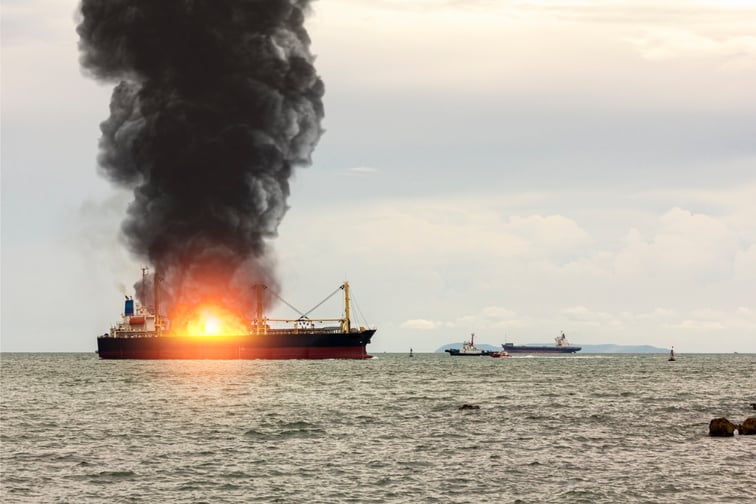

Fires on seagoing vessels have become a major safety concern for the shipping industry, with recent incidents like the Fremantle Highway, a car-carrying vessel that caught fire off the Dutch coast while transporting thousands of vehicles from Germany to Egypt, highlighting the severity of the issue.
Allianz's Safety and Shipping Review 2023 reveals that fire ranked as the second top cause of loss for shipping vessels last year, following foundering, with eight vessels lost and over 200 incidents reported – the highest in a decade.
“Every year Allianz Commercial analyses reported shipping losses and incidents involving ships over 100 gross tons in our annual report,” said Captain Rahul Khanna, global head of marine risk consulting at Allianz Commercial. “And although shipping losses have declined by 65% over the past decade (38 vessels in 2022 compared with over 100 in 2013), unfortunately fire incidents have not followed. We continue to see major events involving large container ships, car carriers and ro-ro vessels for example. There were over 200 reported fire incidents during 2022 alone (209) – the highest total for a decade. Meanwhile, 64 ships have been lost to fires in the past five years. AGCS analysis of 250,000 marine insurance industry claims shows fire is also the most expensive cause of loss, accounting for 18% of the value of all claims analysed.”
Fire-related losses also account for 18% of the value of all claims analysed in the marine insurance industry, Allianz said.
Catastrophic fires on large vessels often originate from combustible cargo, rapidly spreading beyond the crew's firefighting capabilities. The size and design of these vessels make fire detection and fighting more challenging, increasing the risk of a major or total loss. Misdeclaration of cargo is another significant issue, with around 25% of serious incidents on container ships attributed to mis-declared dangerous goods, Allianz reported. Khanna said that proper validation and documentation of hazardous cargo are essential to prevent such blazes.
Li-Ion batteries have also been a contributing factor in recent fires on vessels. These batteries, used in electric vehicles (EVs) and various consumer goods, pose risks due to fire, explosion, and "thermal runaway." The surge in demand for Li-Ion batteries and EVs has flooded the market with new manufacturers, raising concerns about quality control.
Read next: Final report on costly Sue Canal blockage
“Of course, Li-Ion batteries are an important source of energy and do not necessarily burn more frequently than other goods,” Khanna said. “It is only when they ignite that they are more difficult to extinguish as they can burn more ferociously and are capable of spontaneously reigniting hours or even days after they have been put out.”
Khanna said that the shipping industry must take pre-emptive measures to mitigate Li-Ion fire risks, such as ensuring proper SOC levels, requesting certification from manufacturers, providing adequate training and firefighting equipment to crew, and improving early detection systems. Additionally, he suggested unified requirements and penalties for mis-declared hazardous cargo to address the misdeclaration issue.
As the debate over EVs in shipping continues, Khanna said that dedicated Ro-ro vessels for EV transport could significantly reduce the risk of fire. Protective measures for EVs include proper labelling, passing safety tests, secure stowage during transport, and exploring fire-proof blankets specifically designed for EVs.
Recent notable incidents, like the fire on board the car carrier Felicity Ace and the Höegh Xiamen, highlight the urgent need for the shipping industry to address fire risks and implement safety measures effectively, Allianz said.
Have something to say about this story? Let us know in the comments below.
